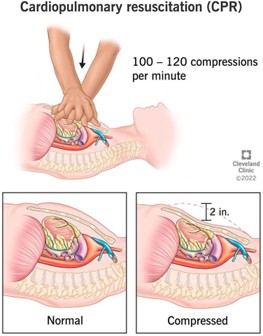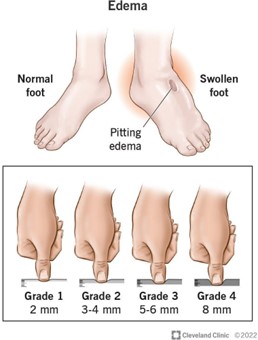A nurse on a cardiac care unit oversees the care of different client’s cardiac health problems. Which action can be most appropriately delegated to personnel (UAP/CNA) when a patrent is found unresponsive?
Obtaining arterial blood gases
Giving IV epinephrine
Initiating CPR
Intubating the patient
The Correct Answer is C
CPR (Cardiopulmonary Resuscitation) is a life-saving procedure that is performed when a person's heart has stopped beating. It involves chest compressions and rescue breathing to restore the circulation of oxygenated blood to the brain and other vital organs. The timely initiation of CPR can significantly increase the chances of a patient's survival.
In a healthcare setting, UAPs/CNAs are often trained to provide basic life support, including initiating CPR, until a healthcare provider arrives. However, giving IV epinephrine, intubating the patient, and obtaining arterial blood gases are all advanced medical procedures that require specialized training and expertise. These actions should only be performed by trained healthcare providers, such as registered nurses, physicians, or respiratory therapists, and cannot be delegated to UAPs/CNAs.

Nursing Test Bank
Naxlex Comprehensive Predictor Exams
Related Questions
Correct Answer is B
Explanation
. Assess your patient’s lower extremities and lungs for fluid retention.
If a patient’s intake is 2500ml and her output is 1200ml from a catheter bag, and you are concerned that she may not be excreting enough urine for the amount of water she is taking in, the most appropriate next step would be to assess her lower extremities and lungs for fluid retention. This can help determine if the patient is retaining water and if further intervention is necessary.

Correct Answer is B
Explanation
Hemoglobin is a protein found in red blood cells that plays a crucial role in transporting oxygen from the lungs to the body's tissues and organs. When oxygen is breathed in, it binds to the hemoglobin in red blood cells, forming oxyhemoglobin. This oxyhemoglobin is then transported throughout the body via the circulatory system, delivering oxygen to the cells that need it
 .
.
Whether you are a student looking to ace your exams or a practicing nurse seeking to enhance your expertise , our nursing education contents will empower you with the confidence and competence to make a difference in the lives of patients and become a respected leader in the healthcare field.
Visit Naxlex, invest in your future and unlock endless possibilities with our unparalleled nursing education contents today
Report Wrong Answer on the Current Question
Do you disagree with the answer? If yes, what is your expected answer? Explain.
Kindly be descriptive with the issue you are facing.
